

_TeachingStandardsv2.pdf. Cato Unbound » Blog Archive » Why Online Education Works. Oxford University was founded in 1096, Cambridge in 1209.
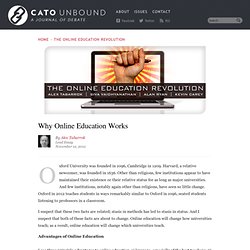
Harvard, a relative newcomer, was founded in 1636. Other than religions, few institutions appear to have maintained their existence or their relative status for as long as major universities. And few institutions, notably again other than religions, have seen so little change. Oxford in 2012 teaches students in ways remarkably similar to Oxford in 1096, seated students listening to professors in a classroom. I suspect that these two facts are related; stasis in methods has led to stasis in status. Tony Bates.
Online Discussion Boards & Rubrics - Pedagogy - Learning - Center for Online Learning, Research and Service - University of Illinois at Springfield - UIS. Discussions Discussion is at the heart of asynchronous online learning.
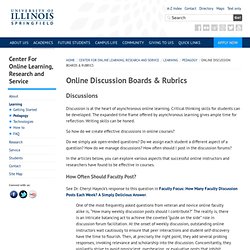
Critical thinking skills for students can be developed. The expanded time frame offered by asynchronous learning gives ample time for reflection. Writing skills can be honed. Online Higher Education Revolution [INFOGRAPHIC] 12 Exciting College Alternatives of Tomorrow, Emerging Today. Instructional Technology: Villain of the Piece—Or Savior? - Top Performers. According to Andreas Schleicher, there is no evidence from the PISA data yet of a consistent relationship between the use of education technology and superior student performance.

That, however, certainly does not mean that no such relationship will exist in the future, just that it hasn't happened yet, at least not at the scale required to show up in the PISA surveys. But that fact has not discouraged policy-makers in this country at all. Online education degrees skyrocket. Virtually unknown a decade ago, big online teacher education programs now dwarf their traditional competitors, outstripping even the largest state university teachers' colleges.
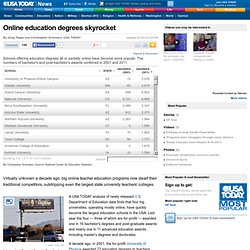
A USA TODAY analysis of newly released U.S. Department of Education data finds that four big universities, operating mostly online, have quickly become the largest education schools in the USA. Types of Learning Management Systems. There are now dozens of different types of Learning Management System, or LMS, used by organizations to manage e-learning and deliver course materials to employees.
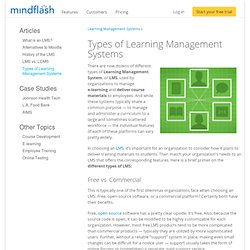
And while these systems typically share a common purpose — to manage and administer a curriculum to a large and sometimes scattered workforce — the individual features of each of these platforms can vary pretty widely. In choosing an LMS, it’s important for an organization to consider how it plans to deliver training materials to students. Then match your organization’s needs to an LMS that offers the corresponding features. Here is a brief primer on the different types of LMS: Free vs. Online Educational Delivery Models: A Descriptive View (EDUCAUSE Review. Phil Hill is an independent consultant and blogs at e-Literate.
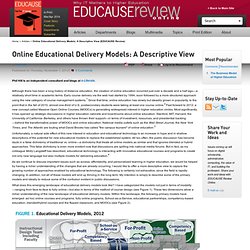
Michael Roth: Education Unplugged: Learning Through Conversation. Sherry Turkle's essay in Sunday's New York Times, "The Flight From Conversation," raised several critical questions about how our desire to be connected via technology can also be a powerful mechanism for avoiding significant human contact.

Turkle, a psychologist and professor at MIT, is no technophobe. She argues, though, that the tiny "sips" of contact through social networking "no matter how valuable ... do not substitute for conversation. " As I finished Turkle's essay, I thought about the implications of her argument for education. Many of our students today are convinced that their ability to connect to several things at once, to deal with feeds coming from blogs, Facebook, Twitter and YouTube while they sit with classmates and professors, is a sign of their increased capacity for learning.
They are, it seems, "processing" more data all the time. Boundless. Online learning in 2012: a retrospective. Stephen Downes: The Role of the Educator. How often do we read about the importance of teachers in education?

It must be every day, it seems. We are told about "strong empirical evidence that teachers are the most important school-based determinant of student achievement" again and again. The problem with the educational system, it is argued, is that teachers need to be held accountable. We are told we must fire incompetent teachers. Not just in the United States, but in the UK and elsewhere, the concern is that bad teachers must go. The problem with focusing on the role of the teacher, from my perspective, is that it misses the point. Let me tell you how I know this. The 10 Key Rules for Managing Time in Online Teaching. June 15th, 2008 By: Errol Craig Sull In my several years of teaching online I have developed a variety of time-management tools that have helped me to stay on top of my classes while making my efforts smoother and easier; hundreds of colleagues I’ve discussed this with over the years also have their favorite ways of managing time.
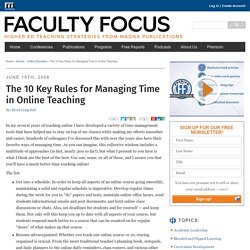
As you can imagine, this collective wisdom includes a multitude of approaches (in fact, nearly 300 so far!) , but what I present to you here is what I think are the best of the best. Topic 1-A. Accredited Online Degree Programs. The Evidence on Online Education. WASHINGTON -- Online learning has definite advantages over face-to-face instruction when it comes to teaching and learning, according to a new meta-analysis released Friday by the U.S.
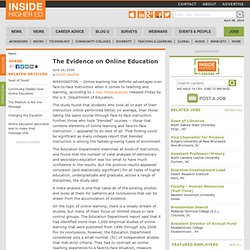
Department of Education. Essay on observing an online extension of an MBA program. “What’s the one thing you’d change?” Asked the dean at a well-known New York institution. As a 30-year veteran of teaching in graduate school business programs (as an adjunct), I may have hesitated before answering. But having just completed my third year in law school, I didn’t miss a beat. "I’d do away with the Internet in the classroom," I answered. "It is simply too distracting.